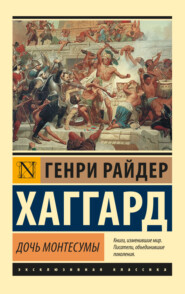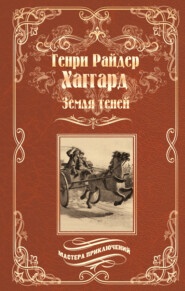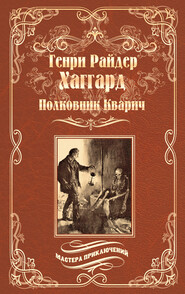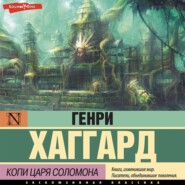По всем вопросам обращайтесь на: info@litportal.ru
(©) 2003-2024.
✖
The World's Desire
Настройки чтения
Размер шрифта
Высота строк
Поля
Then she wrung her hands, and laughed aloud with the empty laugh of fear.
A thought came into that crafty mind of the Wanderer’s, and he answered her, not in his own voice, but in the smooth, soft, mocking voice of the traitor, Paris, whom he had heard forswear himself in the oath before Ilios.
“So, lady, thou hast not yet forgiven Paris? Thou weavest the ancient web, thou singest the ancient songs – art thou still unkind as of old?”
“Why art thou come back to taunt me?” she said, and now she spoke as if an old familiar fear and horror were laying hold of her and mastering her again, after long freedom. “Was it not enough to betray me in the semblance of my wedded lord? Why dost thou mock?”
“In love all arts are fair,” he answered in the voice of Paris. “Many have loved thee, Lady, and they are all dead for thy sake, and no love but mine has been more strong than death. There is none to blame us now, and none to hinder. Troy is down, the heroes are white dust; only Love lives yet. Wilt thou not learn, Lady, how a shadow can love?”
She had listened with her head bowed, but now she leaped up with blazing eyes and face of fire.
“Begone!” she said, “the heroes are dead for my sake, and to my shame, but the shame is living yet. Begone! Never in life or death shall my lips touch the false lips that lied away my honour, and the false face that wore the favour of my lord’s.”
For it was by shape-shifting and magic art, as poets tell, that Paris first beguiled Fair Helen.
Then the Wanderer spoke again with the sweet, smooth voice of Paris, son of Priam.
“As I passed up the shrine where thy glory dwells, Helen, I heard thee sing. And thou didst sing of the waking of thy heart, of the arising of Love within thy soul, and of the coming of one for whom thou dost wait, whom thou didst love long since and shalt love for ever more. And as thou sangest, I came, I Paris, who was thy love, and who am thy love, and who alone of ghosts and men shall be thy love again. Wilt thou still bid me go?”
“I sang,” she answered, “yes, as the Gods put it in my heart so I sang – for indeed it seemed to me that one came who was my love of old, and whom alone I must love, alone for ever. But thou wast not in my heart, thou false Paris! Nay, I will tell thee, and with the name will scare thee back to Hell. He was in my heart whom once as a maid I saw driving in his chariot through the ford of Eurotas while I bore water from the well. He was in my heart whom once I saw in Troy, when he crept thither clad in beggar’s guise. Ay, Paris, I will name him by his name, for though he is long dead, yet him alone methinks I loved from the very first, and him alone I shall love till my deathlessness is done – Odysseus, son of Laertes, Odysseus of Ithaca, he was named among men, and Odysseus was in my heart as I sang and in my heart he shall ever be, though the Gods in their wrath have given me to others, to my shame, and against my will.”
Now when the Wanderer heard her speak, and heard his own name upon her lips, and knew that the Golden Helen loved him alone, it seemed to him as though his heart would burst his harness. No word could he find in his heart to speak, but he raised the visor of his helm.
She looked – she saw and knew him for Odysseus – even Odysseus of Ithaca. Then in turn she hid her eyes with her hands, and speaking through them said:
“Oh, Paris! ever wast thou false, but, ghost or man, of all thy shames this is the shamefullest. Thou hast taken the likeness of a hero dead, and thou hast heard me speak such words of him as Helen never spoke before. Fie on thee, Paris! fie on thee! who wouldest trick me into shame as once before thou didst trick me in the shape of Menelaus, who was my lord. Now I will call on Zeus to blast thee with his bolts. Nay, not on Zeus will I call, but on Odysseus’ self. Odysseus! Odysseus! Come thou from the shades and smite this Paris, this trickster, who even in death finds ways to mock thee.”
She ceased, and with eyes upturned and arms outstretched murmured, “Odysseus! Odysseus! Come.”
Slowly the Wanderer drew near to the glory of the Golden Helen – slowly, slowly he came, till his dark eyes looked into her eyes of blue. Then at last he found his voice and spake.
“Helen! Argive Helen!” he said, “I am no shadow come up from Hell to torment thee, and of Trojan Paris I know nothing. For I am Odysseus, Odysseus of Ithaca, a living man beneath the sunlight. Hither am I come to see thee, hither I am come to win thee to my heart. For yonder in Ithaca Aphrodite visited me in a dream, and bade me wander out upon the seas till at length I found thee, Helen, and saw the Red Star blaze upon thy breast. And I have wandered, and I have dared, and I have heard thy song, and rent the web of Fate, and I have seen the Star, and lo! at last, at last! I find thee. Well I saw thou knewest the arms of Paris, who was thy husband, and to try thee I spoke with the voice of Paris, as of old thou didst feign the voices of our wives when we lay in the wooden horse within the walls of Troy. Thus I drew the sweetness of thy love from thy secret breast, as the sun draws out the sweetness of the flowers. But now I declare myself to be Odysseus, clad in the mail of Paris – Odysseus come on this last journey to be thy love and lord.” And he ceased.
She trembled and looked at him doubtfully, but at last she spoke:
“Well do I remember,” she said, “that when I washed the limbs of Odysseus, in the halls of Ilios, I marked a great white scar beneath his knee. If indeed thou art Odysseus, and not a phantom from the Gods, show me that great scar.”
Then the Wanderer smiled, and, resting his buckler against the pillar of the loom, drew off his golden greave, and there was the scar that the boar dealt with his tusk on the Parnassian hill when Odysseus was a boy.
“Look, Lady,” he said; “is this the scar that once thine eyes looked on in the halls of Troy?”
“Yea,” she said, “it is the very scar, and now I know that thou art no ghost and no lying shape, but Odysseus’ self, come to be my love and lord,” and she looked most sweetly in his eyes.
Now the Wanderer wavered no more, but put out his arms to gather her to his heart. Now the Red Star was hidden on his breast, now the red drops dripped from the Star upon his mail, and the face of her who is the World’s Desire grew soft in the shadow of his helm, while her eyes were melted to tears beneath his kiss. The Gods send all lovers like joy!
Softly she sighed, softly drew back from his arms, and her lips were opened to speak when a change came over her face. The kind eyes were full of fear again, as she gazed where, through the window of the shrine of alabaster, the sunlight flickered in gold upon the chapel floor. What was that which flickered in the sunlight? or was it only the dance of the motes in the beam? There was no shadow cast in the sunshine; why did she gaze as if she saw another watching this meeting of their loves? However it chanced, she mastered her fear; there was even a smile on her lips and mirth in her eyes as she turned and spoke again.
“Odysseus, thou art indeed the cunningest of men. Thou hast stolen my secret by thy craft; who save thee would dream of craft in such an hour? For when I thought thee Paris, and thy face was hidden by thy helm, I called on Odysseus in my terror, as a child cries to a mother. Methinks I have ever held him dear; always I have found him ready at need, though the Gods have willed that till this hour my love might not be known, nay, not to my own heart; so I called on Odysseus, and those words were wrung from me to scare false Paris back to his own place. But the words that should have driven Paris down to Hell drew Odysseus to my breast. And now it is done, and I will not go back upon my words, for we have kissed our kiss of troth, before the immortal Gods have we kissed, and those ghosts who guard the way to Helen, and whom thou alone couldst pass, as it was fated, are witnesses to our oath. And now the ghosts depart, for no more need they guard the beauty of Helen. It is given to thee to have and keep, and now is Helen once more a very woman, for at thy kiss the curse was broken. Ah, friend! since my lord died in pleasant Lacedæmon, what things have I seen and suffered by the Gods’ decree! But two things I will tell thee, Odysseus, and thou shalt read them as thou mayest. Though never before in thy life-days did thy lips touch mine, yet I know that not now for the first time we kiss. And this I know also, for the Gods have set it in my heart, that though our love shall be short, and little joy shall we have one of another, yet death shall not end it. For, Odysseus, I am a daughter of the Gods, and though I sleep and forget that which has been in my sleep, and though my shape change as but now it seemed to change in the eyes of those ripe to die, yet I die not. And for thee, though thou art mortal, death shall be but as the short summer nights that mark off day from day. For thou shalt live again, Odysseus, as thou hast lived before, and life by life we shall meet and love till the end is come.”
As the Wanderer listened he thought once more of that dream of Meriamun the Queen, which the priest Rei had told him. But he said nothing of it to Helen; for about the Queen and her words to him it seemed wisest not to speak.
“It will be well to live, Lady, if life by life I find thee for a love.”
“Life by life thou shalt find me, Odysseus, in this shape or in that shalt thou find me – for beauty has many forms, and love has many names – but thou shalt ever find me but to lose me again. I tell thee that as but now thou wonnest thy way through the ranks of those who watch me, the cloud lifted from my mind, and I remembered, and I foresaw, and I knew why I, the loved of many, might never love in turn. I knew then, Odysseus, that I am but the instrument of the Gods, who use me for their ends. And I knew that I loved thee, and thee only, but with a love that began before the birth-bed, and shall not be consumed by the funeral flame.”
“So be it, Lady,” said the Wanderer, “for this I know, that never have I loved woman or Goddess as I love thee, who art henceforth as the heart in my breast, that without which I may not live.”
“Now speak on,” she said, “for such words as these are like music in my ears.”
“Ay, I will speak on. Short shall be our love, thou sayest, Lady, and my own heart tells me that it is born to be brief of days. I know that now I go on my last voyaging, and that death comes upon me from the water, the swiftest death that may be. This then I would dare to ask: When shall we twain be one? For if the hours of life be short, let us love while we may.”
Now Helen’s golden hair fell before her eyes like the bride’s veil, and she was silent for a time. Then she spoke:
“Not now, and not while I dwell in this holy place may we be wed, Odysseus, for so should we call down upon us the hate of Gods and men. Tell me, then, where thou dwellest in the city, and I will come to thee. Nay, it is not meet. Hearken, Odysseus. To-morrow, one hour before the midnight, see that thou dost stand without the pylon gates of this my temple; then I will pass out to thee as well I may, and thou shalt know me by the jewel, the Star-stone on my breast that shines through the darkness, and by that alone, and lead me whither thou wilt. For then thou shalt be my lord, and I will be thy wife. And thereafter, as the Gods show us, so will we go. For know, it is in my mind to fly this land of Khem, where month by month the Gods have made the people die for me. So till then, farewell, Odysseus, my love, found after many days.”
“It is well, Lady,” answered the Wanderer. “To-morrow night I meet thee without the pylon gates. I also am minded to fly this land of witchcraft and of horror, but I may scarce depart till Pharaoh return again. For he has gone down to battle and left me to guard his palace.”
“Of that we will talk hereafter. Go now! Go swiftly, for here we may not talk more of earthly love,” said the Golden Helen.
Then he took her hand and kissed it and passed from before her glory as a man amazed.
But in his foolish wisdom he spoke no word to her of Meriamun the Queen.
VIII THE LOOSING OF THE SPIRIT OF REI
Rei the Priest had fled with what speed he might from the Gates of Death, those gates that guarded the loveliness of Helen and opened only upon men doomed to die. The old man was heavy at heart, for he loved the Wanderer. Among the dark children of Khem he had seen none like this Achæan, none so goodly, so strong, and so well versed in all arts of war. He remembered how this man had saved the life of her he loved above all women – of Meriamun, the moon-child, the fairest queen who had sat upon the throne of Egypt, the fairest and the most learned, save Taia only. He bethought him of the Wanderer’s beauty as he stood upon the board while the long shafts hailed down the hall. Then he recalled the vision of Meriamun, which she had told him long years ago, and the shadow in a golden helm which watched the changed Hataska. The more he thought, the more he was perplexed and lost in wonder. What did the Gods intend? Of one thing he was sure: the leaders of the host of dreams had mocked Meriamun. The man of her vision would never be her love: he had gone to meet his doom at the door of the Chapel Perilous.
So Rei hasted on, stumbling in his speed, till he came to the Palace and passed through its halls towards his chamber. At the entrance of her own place he met Meriamun the Queen. There she stood in the doorway like a picture in its sculptured frame, nor could any sight be more beautiful than she was, clad in her Royal robes, and crowned with the golden snakes. Her black hair lay soft and deep on her, and her eyes looked strangely forth from beneath the ivory of her brow.
He bowed low before her and would have passed on, but she stayed him.
“Whither goest thou, Rei?” she asked, “and why is thy face so sad?”
“I go about my business, Queen,” he answered, “and I am sad because no tidings come of Pharaoh, nor of how it has fared with him and the host of the Apura.”
“Perchance thou speakest truth, and yet not all the truth,” she answered. “Enter, I would have speech with thee.”
So he entered, and at her command seated himself before her in the very seat where the Wanderer had sat. Now, as he sat thus, of a sudden Meriamun the Queen slid to her knees before him, and tears were in her eyes and her breast was shaken with sobs. And while he wondered, thinking that she wept at last for her son who was dead among the firstborn, she hid her face in her hands upon his knees, and trembled.
“What ails thee, Queen, my fosterling?” he said. But she only took his hand, and laid her own in it, and the old priest’s eyes were dim with tears. So she sat for awhile, and then she looked up, but still she did not find words. And he caressed the beautiful Imperial head, that no man had seen bowed before. “What is it, my daughter?” he said, and she answered at last:
“Hear me, old friend, who art my only friend – for if I speak not my heart will surely burst; or if it break not, my brain will burn and I shall be no more a Queen but a living darkness, where vapours creep, and wandering lights shine faintly on the ruin of my mind. Mindest thou that hour – it was the night after the hateful night that saw me Pharaoh’s wife – when I crept to thee and told thee the vision that had come upon my soul, had come to mock me even at Pharaoh’s side?”
“I mind it well,” said Rei; “it was a strange vision, nor might my wisdom interpret it.”
“And mindest thou what I told thee of the man of my vision – the glorious man whom I must love, he who was clad in golden armour and wore a golden helm wherein a spear-point of bronze stood fast?”
“Yes, I mind it,” said Rei.

















